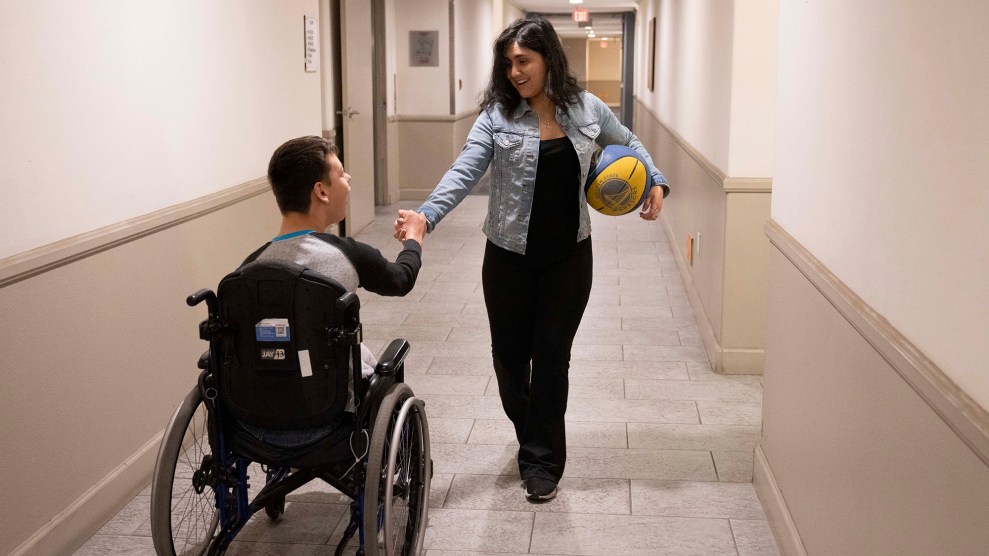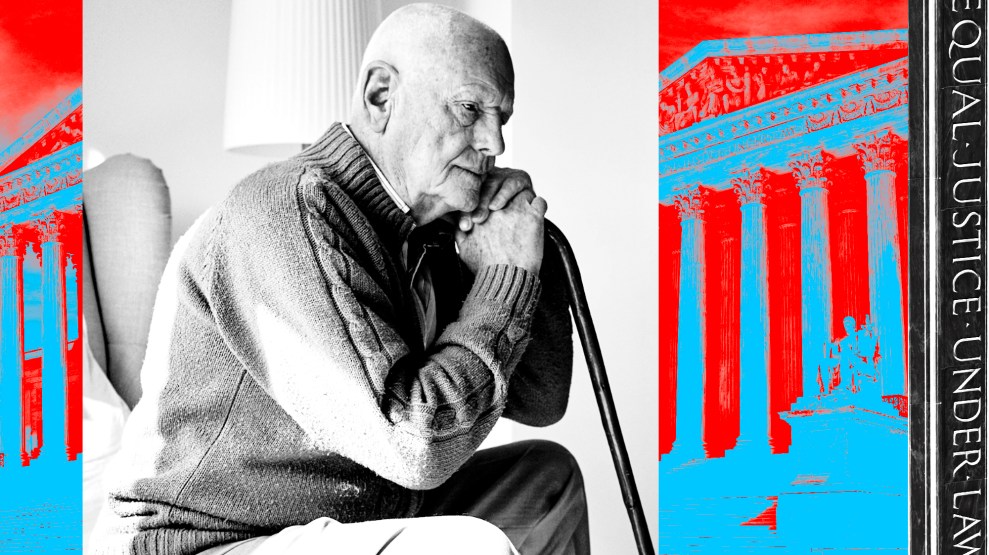
Vice President Kamala Harris speaks at a rally in Flint, Michigan, on October 4, 2024.Andrew Roth/Sipa USA/AP
On Tuesday, Vice President Kamala Harris announced on The View that she would pursue a new Medicare benefit to cover the costs of in-home care for qualifying disabled people and anyone 65 and up.
Disabled people have fought for more than half a century for the right to remain in their homes and communities, rather than being subject to institutionalization—which includes the support, such as home care workers, that they need to do so. A recent poll released by the University of Michigan found that around three in five people older than 50 with a caregiver also have a physical disability. Medicare already covers home care for some people—but in a highly limited way that’s much more challenging to get.
“If you don’t have those services, you might unnecessarily be institutionalized.”
I spoke with Nicole Jorwic, Caring Across Generations’ chief of advocacy and campaigns, about Harris’ new proposal—what it means the people who would qualify, and what it would take for the benefit to succeed, if Harris is elected.
Why does Harris’ plan to expand Medicare excite you?
The plan from the Harris administration to include coverage for home care and Medicare is really a game-changer for disabled people and for older people. This proposal is exciting, not only for the folks that would get the care that they need but also because of the people that would be impacted by not having to provide that care themselves.
The most exciting thing about it for me is that something that I hear when I’m out and about, meeting with folks in the in the care advocacy community—is so many people think Medicare already does this. It’s creating a a benefit in a government funded system that people already think that they’re going to get—fixing a problem that many people don’t even know that they’re going to have until they’re in a crisis.
How could it help disabled people remain at home, rather than in institutions like nursing homes or group homes?
95 percent of disabled people want to live in their homes and in their communities. But the reality is, because Medicaid has traditionally been the main funder for these services, you have to remain in poverty in order to access these services. Also because states can limit how many people they serve, there’s waiting lists.
Adding home care into Medicare would mean that more of the 7 million disabled people who are currently eligible for Medicare— 12 percent of Medicare beneficiaries—then maybe [do] not need to go on waiting lists for services. If you don’t have those services, you might unnecessarily be institutionalized. This proposal to add home care to Medicare would also take some pressure off of the Medicaid system. We could hopefully continue to pull people off of the waiting list and remove the institutional bias that currently exists today.
Why is it also crucial to address the care-worker shortage for a plan like this to be successful?
Anybody who needs home care, those services are going to be provided by a direct care worker, and we are in a direct care worker crisis. Not because there’s not enough people, but because there’s not enough good direct care jobs. What this proposal does also include is ensuring that the folks that are providing these Medicare services are being paid a good wage.
Disability advocates and aging advocates, when we have the opportunity to implement a policy like this [which] would have to move through Congress, we would also ensure that it rides alongside investments that would ensure that every direct care worker, whether they’re paid by Medicaid or Medicare, are paid a family sustaining wage. We have to also address the direct care workforce, that’s the human infrastructure, the people that are actually providing the services, for this program to be successful.
Right now we think about those direct support professionals or home care workers, those folks when they age, don’t have access to home care right away, unless they qualify for Medicaid, which we know can have waiting lists. Vice President Harris’s proposal to add home care to Medicare also would guarantee that those direct care workers who have been historically low-paid would also have peace of mind if they need home care.
Have there been examples of programs at a state level similar to what Harris is proposing?
There isn’t necessarily an example of a state adding to a federal program, but there are some examples of where states have invested in folks that just need a little bit of extra support at home. Under the Affordable Care Act, there was a program that was passed called the Community First Choice Option. It requires states who take up this option, like Oregon and Texas, to provide home and community based care for eligible folks, mostly through personal care assistance, in the same way that that Vice President Harris’s proposal does.
For folks that are on a waiting list, it provides a narrow benefit. We know that if we provide some benefit to people right when they need it, it actually can prevent them, maybe, from needing longer-term care further down the road.
Are there any lessons to learn from the state-level implementation of the Community First Choice Option?
When you look at implementing programs like the Community First Choice Option at the state level, something that’s important to think about is that you want to create as much flexibility as possible. You want to make sure that the services that are being provided are going to meet the unique needs of the senior or the disabled person who needs that care—also making sure that the definition of a workforce is broad enough. There might be somebody who might want it to be their family member, or a disabled person who might want it to be their spouse. You can’t just throw more people into the system without also addressing the workforce.
This interview has been edited for length and clarity.
















